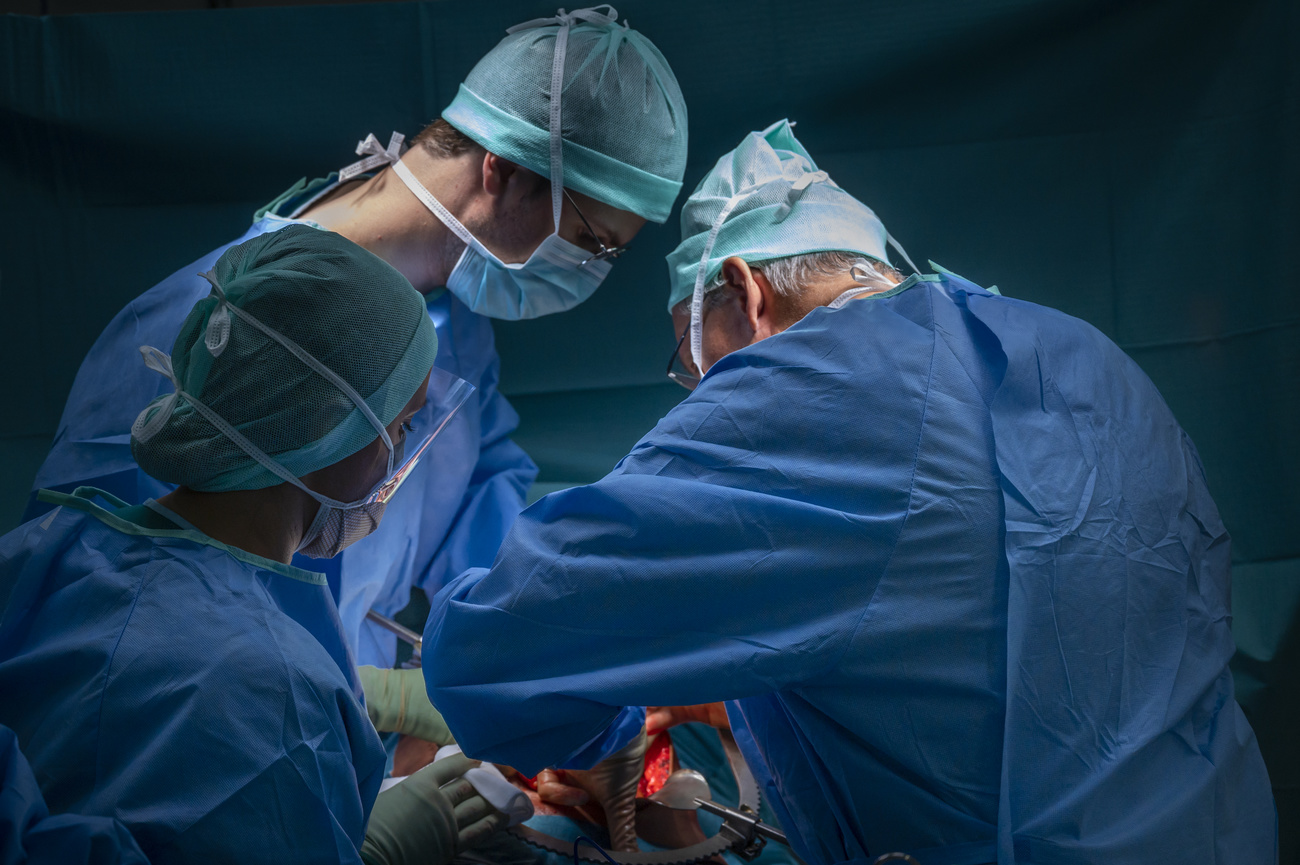Why the Swiss are donating more organs for transplant

Switzerland is gradually showing greater acceptance of donating organs to other people after their deaths.
Do you want to read our weekly top stories? Subscribe here.
In 2022, the Swiss population voted in favour of a new system that presumes people consent to their organs being donated, unless they say otherwise.
Despite delays in the expected implementation of the new law, the number of organ donors rose from 164 in 2022 to 200 last year.
Dr Franz Immer, head of the organisation Swisstransplant, which is responsible for allocating donating organs to those in need, explains this latest development to SWI swissinfo.ch but warns of obstacles to future progress.
Why are more Swiss people donating their organs?
The 22% rise in organ donators from one year to the next has more to do with changes in the transplant system than a shift in public sentiment.
+ Organ donation: lifting the burden on those left behind
Since 2011, Swisstransplant has focused its efforts on increasing the number of donations from people who die from cardiac failure rather than to brain deaths.
The rate of ‘Donation After Cardiac Death’ (DCD) has more than doubled from 50 donors in 2020 to 96 last year (see graph). In the same time frame, ‘Donation After Brain Death’ (DBD) figures are largely consistent (96 in 2020; 104 in 2023).
“The number of hospitals on the DCD programme has now reached enough critical mass to make a difference,” said Immer.
Another factor is the introduction of a new digital system in 2021 that connects hospital intensive care units with Swisstransplant data on patient inclusion criteria and waiting lists.
The need for enhanced data sharing was highlighted during the Covid pandemic when Swisstransplant battled to maintain surgical operations at overwhelmed hospitals.
Immer expects the number of patients needing transplants to rise as the Swiss population both increases and ages. “We needed to improve our processes to reach the target of 300 to 350 donors per year,” he said.
How does the organ donation rate compare with other countries?
“For the very first time, Switzerland is among the leading European countries for organ donations,” said Immer, in reference to the 2023 figures.
This is backed up by statistics from the International Registry on Organ Donation and Transplantation (IRODaT). This an opensource database run by the Barcelona-based non-profit Donation & Transplantation Institute (DTI).
Last year, Swiss organ donors measured in at 22.73 per million of population (PmP). This compares favourably with France (25.9 PmP), Germany (11.58 PmP), Italy (25.5 PmP), Britain (21.08 PmP) and the Netherlands (17.29 PmP).
In previous years, Switzerland has lagged behind European neighbours (see graph).
Did the 2022 nationwide vote on organ donor consent help boost numbers?
“Not at all,” said Immer. “We even observed a decrease in donors in 2022 because some parts of the media published nightmare stories which were not realistic, and which worried many people.”
“Trust and confidence in the system is key to success with such a delicate topic,” he added.
In 2021, 55% of relatives rejected requests for the organs of their deceased family member. Last year, the rejection rate had risen to 58%, according to Swisstransplant.
What impact could the new consent laws have on donor numbers in future?
The Netherlands, which introduced the system of presumed consent in 2020, could be used as a case study for Switzerland.
Three years after implementing the revised law, the Netherlands saw donor consent rise from 42% of the population to 55%, says Immer.
But the Swiss implementation of the vote, which raised some controversy among the population, has not proceeded as quickly as first thought. Initial expectations that the law would come into force by the end of this year have not been realised.
The government has decided to coordinate a digital database, which would record peoples’ organ donation wishes, with the introduction of a new eID system.
This is expected to come into operation in 2026 at the earliest – provided it does not get delayed by another challenge by public vote.
Can Swiss hospitals cope with increased transplant donation demand?
Swisstransplant is convinced that the number of organ donors will increase when the consent law change comes into force.
Immer believes that an increased supply of organs will persuade hospitals to add more patients to the waiting list. But one consequence of this would be to add pressure on transplant surgeons.
“Availability of skilled transplant hospital staff is my biggest concern for the future,” said Immer. “Resources are stretched at hospitals, not only surgeons, but other operating room staff.”
“More than 90% of transplant operations take place outside of office hours – overnight and at weekends. The new generation of medical staff seem less willing to accept these hours,” he added.
“Hospitals need to start moving to meet the expected increase in donors in two to three years’ time.”
Edited by Mark Livingston/sb

In compliance with the JTI standards
More: SWI swissinfo.ch certified by the Journalism Trust Initiative









You can find an overview of ongoing debates with our journalists here . Please join us!
If you want to start a conversation about a topic raised in this article or want to report factual errors, email us at english@swissinfo.ch.